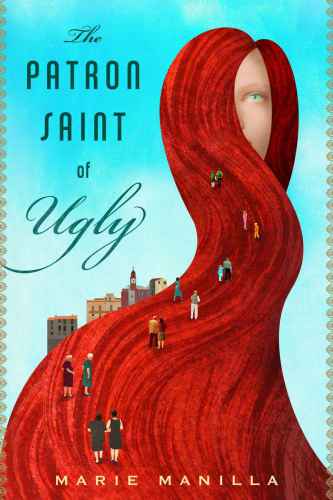
The Patron Saint of Ugly
کتاب های مرتبط
- اطلاعات
- نقد و بررسی
- دیدگاه کاربران
نقد و بررسی

April 7, 2014
Manilla’s second novel is clever, funny, heartbreaking, and heartwarming, all at once. Garnet Ferrari, of Sweetwater, W.Va., has flaming red hair and birthmarks over her entire body that create a map of the world. Intelligent and sharp-tongued, she is the product of an Italian Catholic father and a lapsed-Episcopalian mother. Garnet finds solace in her maternal grandfather’s collection of globes and her maternal grandmother’s deeply rooted beliefs—a mixture of paganism and Catholicism. After Garnet seemingly manifests magical abilities of healing, the people of Sweetwater and beyond come to believe that she is a saint. The Vatican sends out an investigator to verify Garnet’s supposed powers, which she herself doubts. It takes a while to warm up to the structure of the book, presented as a transcript of the investigator’s interview with Garnet, with occasional interruptions from her Italian grandmother and her Aunt Betty, but it’s worth it. Garnet digs through the tangled past of both bloodlines, looking for answers and learning to move toward people rather than shut them out. How she manages to do that results in a lovely, hopeful tale. Agent: Kate Garrick, DeFiore and Company.

May 1, 2014
Mermaids, maps, amulets and machismo all figure in this tall, busy tale about a girl's coming-of-age amid plain and improbable family lore.Manilla's (Shrapnel, 2012, etc.) second novel features the sassy voice of Garnet Ferrari as she responds irreverently to a Vatican emissary's questions about the origins of miraculous powers she denies having. Born covered with port-wine stains shaped like atlas cutouts, she seems to heal the skin problems of others. Flashbacks to her early life in the 1950s reveal a range of cruelties, from others shunning or mocking her to the favoring of her smart, beautiful brother and the bullying swagger of her uncle. The past also holds love and pain elsewhere in the family, especially an ill-fated triangle with roots in Sicily and thorny branches in the Ferraris' U.S. home of Sweetwater, W.Va. Manilla plays with different shades of poverty and wealth as Garnet makes a Dickensian journey from low-income housing to a hilltop mansion. The transition includes visits and extravagance from her maternal grandmother, a rich Virginian with Mayflower antecedents. Her paternal counterpart is Nonna Diamante, long-suffering survivor of a bad marriage who melds Catholic faith and belief in malocchio (the evil eye). She's a colorful soul and a frequent commentator whose accented English phrasings recall-cutely, then cloyingly-those of Chico Marx. There's even an environmental lesson about clean water running through all this, a real issue in mining-scarred West Virginia. The narrative variety-from saintly myth to Twain-ian stretcher, shifting speakers, newspaper clippings, a 60 Minutes transcript and two pages covered with the letter Z-brings to mind another unusual autobiography, Laurence Sterne's Tristram Shandy.Manilla's compulsive embellishment can be wearying, and her ending verges on treacle, which is surprising after what has been at heart a cleareyed, touching fable of a girl learning the hard truths about herself and others.
COPYRIGHT(2014) Kirkus Reviews, ALL RIGHTS RESERVED.

May 1, 2014
Garnet Ferrari of Sweetwater, West Virginia, is known for three things: her flaming red hair, a body covered in port-wine birthmarks resembling a world map, and her occasional ability to perform miracles. Garnet's sharp tongue and ability to defend herself from the taunts of both strangers and family members have always worked well. But now she is unable to fend off the hordes of pilgrims who have descended upon her hilltop home begging for her miraculous cures. Her reputation has also brought Father Archibald Gormley, a representative of the Vatican sent to determine whether Saint Garnet, as she is known locally, is truly deserving of her name. The Patron Saint of Ugly is a narrative of Garnet's life as told to Father Gormley so that he may judge her worthiness. Manilla, whose first novel, Shrapnel (2011), won the Fred Bonnie Award for Best First Novel, has created a complex, endearing character, whose story will absorb readers from beginning to end. Beautifully written, filled with detailed prose meant to be savored, Manilla's latest is a captivating reminder of the blurred line between myth and reality.(Reprinted with permission of Booklist, copyright 2014, American Library Association.)

























دیدگاه کاربران